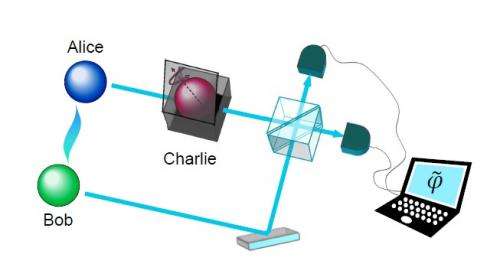May 16, 2014 feature
Quantum correlations make you never fail a test again
Lisa Zyga
contributing writer

(Phys.org) —In the burgeoning field of quantum metrology, quantum effects are exploited to improve the precision when measuring a variety of parameters, such as phase, frequency, and magnetic fields. A main goal of this research is to develop high-accuracy measurement devices that could benefit many areas of science. In a way, explains physicist Gerardo Adesso at the University of Nottingham in the UK, this goal is similar to preparing to answer the most difficult question on an academic exam.
"Alice is reviewing for an exam, helped by her friend Bob," Adesso told Phys.org. "How can she make sure she will be prepared to answer even the hardest question? We solve this problem here: she needs to share quantum correlations with Bob in the first place, of a general type which can manifest even in the absence of entanglement."
Adesso and his coauthors have investigated the quantum version of Alice's exam problem in a paper accepted for publication in Physical Review Letters. In the quantum scenario, the goal is to measure as precisely as possible the angle at which a quantum state has been rotated after a transformation. A high degree of precision is equivalent to a high exam score.
As all good students know, the key to achieving a high exam score lies in preparation. The same is true for achieving a high degree of precision when measuring a quantum state's angle of rotation. The quantum state must be prepared in a way so that it is sensitive to rotations in all directions, even the most insensitive direction (this is the worst-case scenario, which is equivalent to the most difficult exam question).
One way to prepare a quantum state that meets these requirements is, as Adesso explained above, correlating the probe quantum system with another quantum system using quantum discord. In the exam analogy, you might think of a cheating party outside the room which the student under examination is in touch with.
"Precisely, we find quantum discord to exactly quantify the minimum guaranteed precision in estimating phase shifts (angles) when the direction is not known a priori," Adesso said. "That is, it exactly measures the minimum score you would get on the test, which is the score you would get if you happen to get the question you are least prepared for. If the state in the beginning has only classical correlations (zero discord) then you can be unlucky and get the question you are completely unprepared for, and you score zero. If you have any amount of quantum discord, your score can never fall below that."
By demonstrating that quantum discord-type correlations, but not classical correlations, guarantee a non-zero degree of precision in measuring the angle of rotation, the results provide the first example of the usefulness of quantum discord, which is a relatively new form of quantum correlations. The researchers established these results both theoretically and experimentally with nuclear magnetic resonance.
The results shed new light on the potential of quantum correlations for quantum technologies, particularly under adverse conditions.
"This has a lot of applications," Adesso said. "For the moment it is a proof-of-principle which shows that discord is a fundamental resource. Basically this shows that discord has a precise meaning linked to quantum coherence of a subsystem in all possible bases. In short, if you require coherence (superposition in a certain preferred basis) for applications such as metrology, sensing, quantum cryptography, etc., then using correlated states with discord guarantees you a success in your protocol even if you do not know the preferred basis."
Currently, Adesso added, the UK is investing 270 million GBP in quantum technologies, including sensing and metrology implementations for commercial applications. The new results here show that quantum discord can provide a cheaper resource than entanglement, making it a key ingredient for reliable quantum technology.
In the future, the researchers plan to further explore the properties of quantum discord, as well as potential applications.
"In particular we want to extend the setting to optical metrology with squeezed light, which has important applications for gravitational wave detectors," Adesso said. "I would like to further look into applications for medical imaging and magnetometry as well.
"More fundamentally, I am interested in understanding the physical properties of general quantum correlations and characterizing their resilience to noise. The picture we had in this paper was for the estimation of unitary transformations. If the transformations are noisy, discord can be degraded but in some cases it gets enhanced instead. One can then check whether this would result in a noise-empowered precision in estimation. Perhaps this is already exploited in natural phenomena, where coherence is found to flourish in noisy environments and has a functional role for the system's optimization (e.g., in light harvesting). After all, we clearly showed how coherence is nothing but the daughter of quantum discord."
Written for you by our author Lisa Zyga—this article is the result of careful human work. We rely on readers like you to keep independent science journalism alive. If this reporting matters to you, please consider a donation (especially monthly). You'll get an ad-free account as a thank-you.
Publication details
Davide Girolami, et al. "Quantum discord determines the interferometric power of quantum states." Physical Review Letters. To be published. Also at arXiv:1309.1472 [quant-ph]
Journal information: Physical Review Letters
© 2014 Phys.org



















